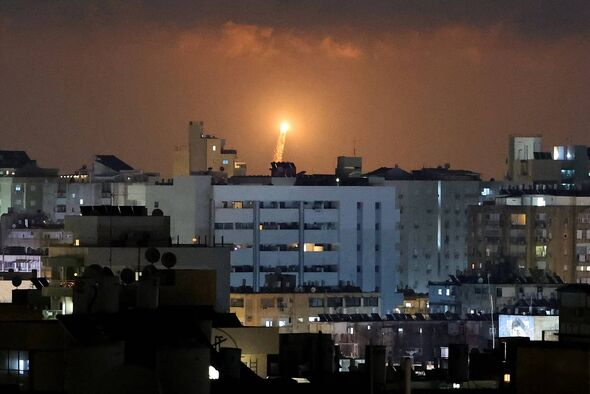
Rocket trails are seen in the sky above the Israeli coastal city of Netanya amid a fresh barrage of Iranian missile attacks on June 17, 2025. Israel and Iran exchanged fire again on June 17, the fifth day of strikes in their most intense confrontation in history, fuelling fears of a drawn-out conflict that could engulf the Middle East. (Photo by JACK GUEZ / AFP) (Photo by JACK GUEZ/AFP via Getty Images) (Image: AFP via Getty Images)
The world holds its breath as the US contemplates joining Israel‘s strikes on Iran, with the Supreme Leader narrowly avoiding the attacks. Amidst this tension, Trump has called for Iran’s “immediate surrender” and hinted at a potential plot to take out Iran’s revered leader.
But the question on everyone’s lips is why the US is so entangled in Israel‘s disputes?
The Express sheds light on this complex issue, providing answers to five crucial questions about the escalating conflict between Israel and Iran, its roots, and the potential repercussions for the global community. Here’s the essential information:
Q: What sparked the missile exchange between Israel and Iran?
A: Ever since the 1979 Iran Revolution, there’s been friction, with the current Iranian regime denying Israel‘s right to exist and even advocating for its annihilation, reports the Mirror.
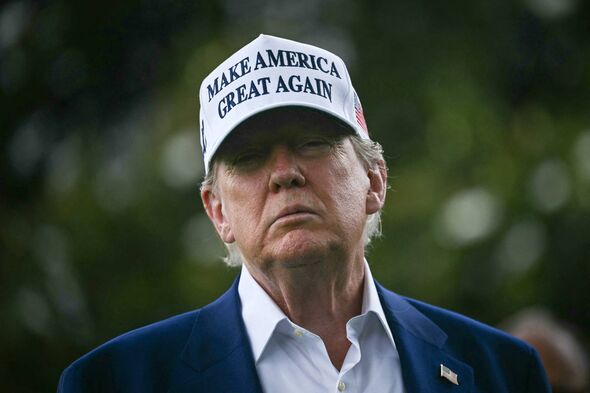
TOPSHOT – US President Donald Trump speaks to the press as workers install a large flag pole on the South Lawn of the White House in Washington, DC on June 18, 2025. President Trump left the question of whether the United States will join Israeli strikes on Iran up in the air Wednesday, as he said that Tehran had reached out to seek negotiations. “I may do it, I may not do it. I mean, nobody knows what I’m going to do,” Trump told reporters as he supervised the installation of a new flagpole on the White House South Lawn. (Photo by Brendan SMIALOWSKI / AFP) (Photo by BRENDAN SMIALOWSKI/AFP via Getty Images) (Image: AFP via Getty Images)
Iran has been backing groups like Hamas in Gaza, Hezbollah in Lebanon, and the Houthis in Yemen, arming and training them to confront Israel indirectly. Meanwhile, Israel accuses Iran of striving to develop nuclear weapons.
The situation intensified when Israeli PM Netanyahu warned that Iran’s nuclear capability was becoming an immediate threat, possibly within months. He seized the chance to target Iran’s nuclear sites, especially with Hezbollah and Hamas weakened and the Houthis suffering from Israeli assaults.
This military engagement has also conveniently shifted focus away from Israel‘s conflict in Gaza.

Municipal workers clear the wreckage and debris in the northern Israeli town of Tamra, following an overnigh missile attack from Iran on June 15, 2025, where four people were reported killed. Israel unleashed a punishing barrage of strikes targeting the capital Tehran on June 15, after Prime Minister Benjamin Netanyahu vowed to make Iran pay “a very heavy price” for killing civilians, on the third day of fierce fighting. (Photo by AHMAD GHARABLI / AFP) (Photo by AHMAD GHARABLI/AFP via Getty Images) (Image: AFP via Getty Images)
Q: How does the rest of the Middle East view this situation?
A: While Iran may publicly criticise Israel, it has limited allies in the Middle East. This is largely due to its Shia theocracy, which creates a natural divide with the predominantly Sunni Middle East, and its aggressive expansionist ambitions.
Previously, Syria was its main ally until the recent overthrow of the Bashar al-Assad regime. Saudi Arabia has been on the brink of war with Iran for years.
Its primary allies now are the authoritarian trio of Russia, China, and North Korea, along with the Houthis in Yemen.
Q: Why would the US support Israel in a conflict with Iran?
A: The US has traditionally been Israel‘s staunchest supporter since 1948, providing military, political, and diplomatic backing. This support stems from the post-WWII desire for a Jewish homeland following the Holocaust.
Furthermore, Israel provides the US with a significant foothold in the Middle East, aiding America’s long-term strategy to manage regional tensions.
The US-Israel relationship proved particularly beneficial during the Cold War. Additionally, Israel‘s dominance and effectiveness in intelligence have been invaluable to the US.

Mourners attend the funeral of victims of an Iranian missile attack which destroyed a three-storey building in the northern Arab-Israeli city of Tamra on the weekend killing four women, in Tamra on June 17, 2025. An Iranian missile killed four people in the city of Tamra on June 14: Manar al-Qassem Abu al-Hija Khatib (39), her two daughters Hala (13) and Shada (20), and their relative Manar Diab Khatib (41). Dozens more were wounded. (Photo by MAYA LEVIN / AFP) (Photo by MAYA LEVIN/AFP via Getty Images) (Image: AFP via Getty Images)
Q: Are we on the brink of World War Three?
A: Hopefully not, but some argue that WWIII has already begun with the hybrid warfare that Iran, North Korea, and China are waging against the West. Cyber warfare and espionage are becoming increasingly aggressive.
This is beneath the level of full-scale war, but Iran has previously attempted to assassinate individuals in the UK, particularly dissident diaspora, and Russia has done so on several occasions.
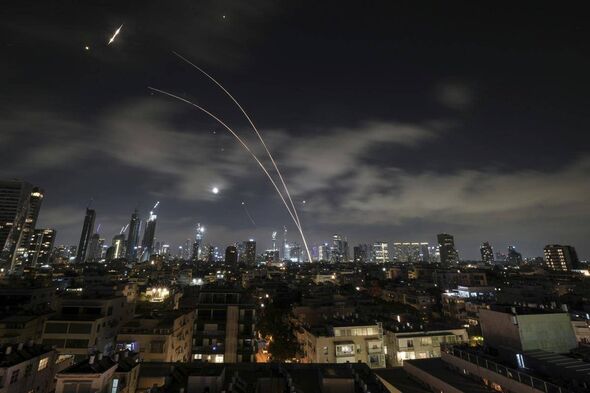
Israel has intercepted more Iranian missiles during the aerial conflict between the two nations (Leo Correa via AP) (Image: AP)
Missile launches and open conflict between two nations with allies like Iran and Israel can escalate into war as other parties are drawn into their violence – a scenario we’re currently witnessing with the US arming the Middle East.
A single incorrect calculation or called bluff could trigger a significant explosion, making de-escalation challenging.
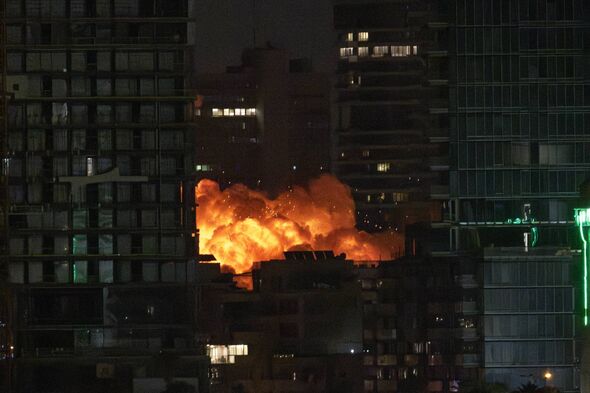
TEL AVIV, ISRAEL – JUNE 16: Smoke and flame rise after Iranian strikes hit a building as Iran’s ongoing retaliatory attacks with ballistic missiles towards Israel are seen from Tel Aviv, Israel on June 16, 2025. (Photo by Mostafa Alkharouf/Anadolu via Getty Images) (Image: Anadolu via Getty Images)
Q: What will happen next?
A: Predicting the exact outcome is nearly impossible, but it’s likely that the US will join the war against Iran’s nuclear programme, prompting Russia, China, and North Korea to deeply consider how much support they should provide Tehran.
Israel‘s assessment is that a nuclear-armed Tehran would pose a threat to its very existence, hence the risk of a broader war is deemed acceptable.
The US may believe, perhaps correctly, that China, in particular, will act sensibly and back down as this isn’t the right time to engage in war with the US. Russia is so weakened that it may no longer pose a threat, and North Korea is so unstable that its actions, though aggressive, are unpredictable.
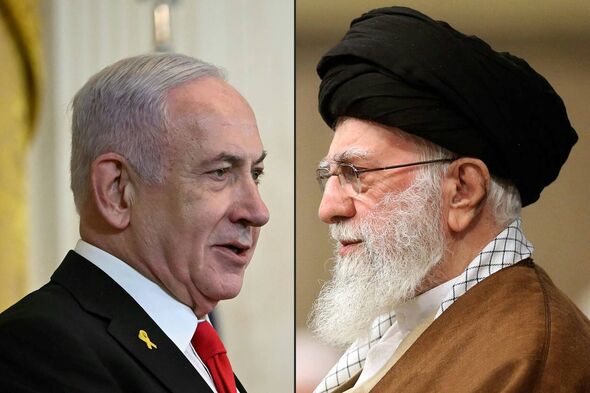
This combination of pictures created on June 18, 2025 shows (L to R) Israel’s Prime Minister Benjamin Netanyahu speaking during a press conference with the US President at the White House in Washington, DC, on February 4, 2025; and a handout picture provided by the office of Iran’s Supreme Leader Ayatollah Ali Khamenei on December 11, 2024 showing him addressing supporters in Tehran. (Photo by ANDREW CABALLERO-REYNOLDS / various sources / AFP) / RESTRICTED TO EDITORIAL USE – MANDATORY CREDIT “AFP PHOTO / HO / KHAMENEI.IR” – NO MARKETING NO ADVERTISING CAMPAIGNS – DISTRIBUTED AS A SERVICE TO CLIENTS (Photo by ANDREW CABALLERO-REYNOLDS,-/POOL/KHAMENEI.IR/AFP via Getty Images) (Image: POOL/KHAMENEI.IR/AFP via Getty I)
A period of brinkmanship might follow, characterised by state muscle-flexing and subsequent de-escalation. However, none of this is certain.
And while a World War seems almost unthinkable, it remains a possibility one day.














